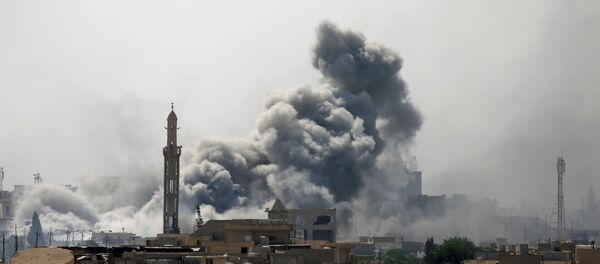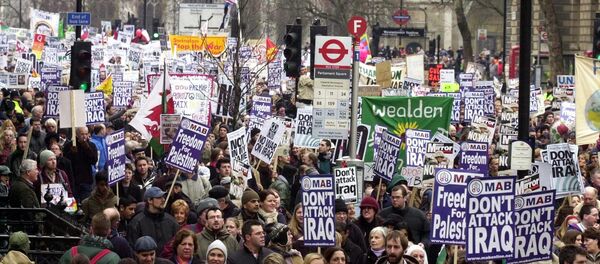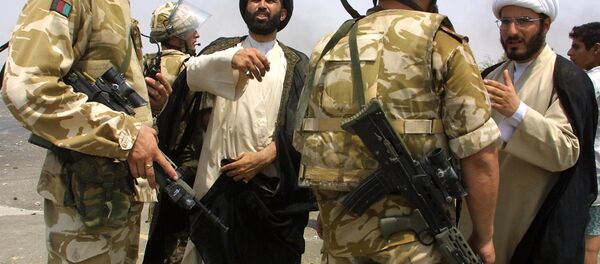From the MI6 operation to plant misleading news stories about the threat posed by Iraq to a fake terror plot involving a biological poison, the tale of the British government's case for war in Iraq is beset by falsehoods and manipulation. The first British dossier on Iraq's WMD program was largely written by a spin doctor, and the senior intelligence officer who put his name on it was asked to minimise any doubts or caveats that he wanted to include.
READ MORE — The Iraq War 15 Years On: No Body Count, No Accountability, No End in Sight
Operation Mass Appeal
Efforts to build up public support for a second war in Iraq began in the late 1990s with a propaganda operation codenamed Mass Appeal. According to former UN Chief Weapons Inspector Scott Ritter he was personally involved in this program from the summer of 1997 to his resignation in August 1998.
"I was brought into the operation in 1997 because… I sat on a body of data which was not actionable, but was sufficiently sexy that if it could appear in the press could make Iraq look like in a bad way."
Ritter said that he "met with Mass Appeal operatives both in New York and London on several occasions" and provided them with the data they requested. He explained:
"They took this information and peddled it off to the media, internationally and domestically, allowing inaccurate intelligence data to appear on the front pages. The government, both here in the UK and the US, would feed off these media reports, continuing the perception that Iraq was a nation ruled by a leader with an addiction to WMDs."
No Convincing Intelligence (or Common Sense)
With the public primed, in the wake of the 9/11 attacks both the US and UK governments were looking to exploit the event to advance a more aggressive foreign policy. However, British intelligence knew all along that the case being made for the Iraq war was not true. In December 2001 a letter from MI6 chief Sir Richard Dearlove was sent to Sir David Manning, Tony Blair's main foreign policy advisor. It included several Top Secret papers on Iraq that outlined MI6's assessment. The first paper noted that:
The second paper outlined several of the reasons for seeking to remove Saddam's government from power, commenting, "The removal of Saddam remains a prize because it could give new security to oil supplies."
Not long after, in March 2002 the deputy Director General of MI5 Eliza Manningham-Buller sent a memo to the Permanent Secretary at the Home Office Sir John Gieve. It discussed the possibility of Saddam Hussein's government ordering terrorist attacks in response to a Western intervention in Iraq. The memo explains that heightened tensions were "unlikely to prompt Saddam to order terrorist strikes against Coalition interests." It continued "Even limited military action is unlikely to prompt such a response" and concluded, "Saddam is only likely to order terrorist attacks if he perceives that the survival of his regime is threatened."
READ MORE: 'Excited at the Prospect': UK Used Iraq's Invasion of Kuwait to Boost Arms Sales
In the run up to the war MI6 knew that there was no good reason to think that Saddam was sponsoring Al Qaeda or related Sunni terrorist gangs, and MI5 believed he would only order terrorist attacks in the event of a Western-led invasion of Iraq.
Weapons of Mass Destruction
The other half of the coalition's argument for war was Iraq's WMD programs, which in conjunction with Saddam's alleged support for terrorism made war the only option, and a necessary one to take, in the eyes of the Bush and Blair governments. But according to the Joint Intelligence Committee (JIC), who co-ordinate the British intelligence services and produce assessments for the Cabinet and the Prime Minister, there was no pressing issue. The JIC's assessment of March 2002 stated, "Intelligence on Iraq's weapons of mass destruction (WMD) and ballistic missile programmes is sporadic and patchy."
Williams was part of the Coalition Information Centre, a unit within the Foreign Office being run by Tony Blair's spin doctor Alistair Campbell. This unit oversaw the drafting of the September dossier and it was Williams' version that Scarlett used as the basis for his version.
The First Dodgy Dossier
Williams did not just write the key draft that was given to Scarlett, he also wrote the media strategy on how it should be used. A minute written by Williams in early September 2002 titled Iraq Media Strategy said:
"There is no ‘killer fact' in the dossier which ‘proves' that Saddam must be taken on now, or this or that weapons will be used against us."
Even the author of the dossier knew that it was not convincing. As the draft was shared around select officials in Whitehall, some people began to voice their scepticism. An email from an unnamed Cabinet Office official commented on a paragraph about Iraq assembling specialists to work on its nuclear programme, saying, "Dr Frankenstein, I presume? Sorry, It's getting late…".
READ MORE: UK Increases Military Presence in Iraq — Defense Secretary
Other criticisms came from the Defense Intelligence Staff (DIS) who reviewed drafts of the dossier. DIS emails show scepticism about various aspects of the assessment, from the timelines presented to how strong the source information really was, but none of these doubts affected the final draft of the dossier.
Instead, Scarlett was specifically asked to minimise the number of caveats and qualifiers he added to the report. A memo from Desmond Bowen, Director-General of Operational Policy in the Ministry of Defence told Scarlett:
"In looking at the WMD sections, you clearly want to be as firm and authoritative as you can be. You will need to judge the extent to which you need to hedge your judgements with, for example, "it is almost certain" and similar caveats. I appreciate this can increase the authenticity of the documents in terms of it being a proper assessment, but that needs to be weighed against the use that will be made by the opponents of actions who will add up the number of judgements on which we do not have absolute clarity."
Ultimately, the dossier was written by spin doctors rather than intelligence analysts, and contradicted the assessments of British intelligence just a few months earlier. As the Downing Street Memo concluded about what was happening in the US, "the intelligence and facts are being fixed around the policy". The same was true in the UK.
The Ricin Plot that Never Was
In early February 2003, US Secretary of State Colin Powell addressed the United Nations Security Council, seeking a new resolution to back the war. In his presentation he connected Abu Musab Al Zaqarwi's Al Qaeda organisation in Iraq with the arrest in the UK the previous month of a group who were supposedly plotting a massive terrorist attack using ricin. Powell told the UN:
"Members of this network have been apprehended in France, Britain, Spain and Italy…We know about this European network and we know about its links to Zarqawi…When the British unearthed the cell there just last month, one British police officer was murdered during the destruction of the cell."
However, Bourgass was arrested entirely by accident, as the authorities had no idea where he was after skipped an asylum appeal hearing in November 2001. When Bourgass and four others were put on trial for the so-called ‘ricin plot' only Bourgass was convicted, and not on terrorism charges. It emerged that Bourgass had never made any ricin and the initial test results showing traces of the poison were a false positive. Though recipes for ricin were found in the flat these did not come from Iraq or Afghanistan, as the government alleged. Bourgass had downloaded them from the website of an American right-wing survivalist named Kurt Saxon.
The End Result
While both the central government and the UK intelligence services have faced criticism for their role in the build-up to the war, no one was fired or prosecuted, and several earned promotions. Not least of these was John Scarlett who was given a knighthood, and the job he'd always wanted as head of MI6, for his troubles.









